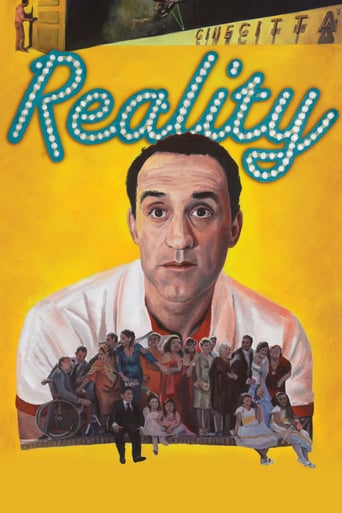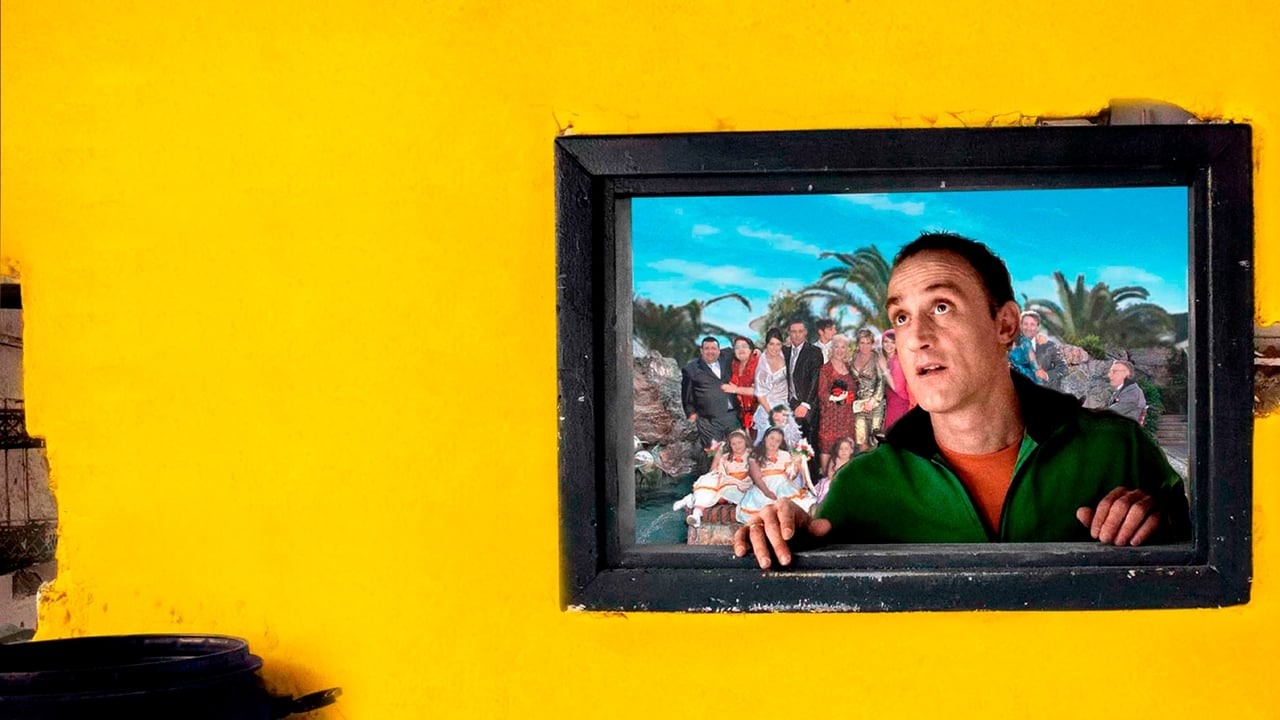JvH48
I saw this film as part of the Rotterdam film festival 2013 (IFFR), about someone pressured by his family to candidate himself for a Big Brother house. It all gets out of hand when he is not accepted initially but yet thinks to be on a sort of waiting list while being observed by the Big Brother team. He assumes being selected for a very special role in that TV show, and will be given a part later on when he proves to fit their criteria.During the final Q&A the director said that the film is about dreaming to escape from reality and to loose one's identity. He describers the main character (Luciano) to be a victim of the system. Luciano desire to get into the Big Brother house comes from initial pressure by his family, though later on he himself gets a bit mad about it. He continues with rigor, in spite of protests from the same family that pressured him in the first place. The importance of the family cannot be stressed enough and has a crucial role in the story, something typical for Italy as stated by the director.The story forming the basis for this scenario really happened to a brother of the director's wife. (By the way: He is fully recovered now. He has even re-opened his fish shop at the same spot in Naples.) And giving away his furniture to make a good impression on imaginary inspectors, was also real, even to the extent that his wife did not dare leaving the house in fear of finding it empty on return. Even the cricket that Luciano suspected to be full of camera's, appeared in reality too. The ending scenes seem a bit far fetched (I won't reveal details, for spoilers sake), but can be deemed all right if it really comes from the true story that was the basis of this film.The director also said that the actors were taken from theater or cabaret (except one, a family member). Faces were an important criterion in the selection process. The roles they play and their appearances reflect a "normal" family from the region. That explains the overload of wrinkled people, and especially women looking like the stereotypical "mama" that we see in food commercials. Luckily, the main characters (Luciano and his wife) are not so bad looking, in contrast to their entourage.All in all, the film is a nice product with many hilarious moments. It is a bit too long, in my opinion, particularly when you get easily annoyed by heavily gesturing Italians, talking with a waterfall of words (it looks that way for us, understanding no Italian) and overly dramatic movements. We won't consider this movie memorable, but it serves its purpose as family entertainment very well. Anyway, the audience seemed to enjoy themselves nevertheless. The venue (over 500 seats) was fully booked on a Sunday morning.
georgep53
A horse driven coach beautifully adorned and accompanied by elegantly dressed coachmen makes its way to a wedding ceremony while the grubby business of daily life goes on around it. One can almost imagine the clock striking midnight and the coach reverting back into a pumpkin while the horses & coachmen become mice. Like the folks sitting in the coach we crave our escapist fantasies even though we know that when we wake up in the morning the world will still be the same old place. But what happens when a man becomes so desirous of fame & fortune that the real world seems fake and the dream world becomes reality? That forms the basis of Matteo Garrone's Cannes Film Festival 2012 Grand Prix winner--"Reality" a wonderfully entertaining comedy-drama starring Aniello Arena as Luciano a fishmonger who lives a quiet middle class life with his wife and children. His wife, Maria, played by Loredana Simioli works as a marketer for a dubious new device called the "Robot" which promises to revolutionize work in the kitchen. Arena's friend and employee Michele (Nando Paone)is devoted to religious iconography and can't seem to stop making the sign of the cross while attending church. After Luciano is persuaded one day to audition for the Italian version of "Big Brother" his determination to join the cast becomes the pivotal objective of his life so much so that his friends begin to worry that he may be losing his mind.In "Reality" Garrone masterfully satirizes a world governed by superstition, consumerism and the ultimate hallucinogen-----television. Reality television is no more real than anything else on the tube. It's like sitting in a carriage that will turn into a pumpkin when the cameras stop rolling. Aniello Arena and Loredana Simioli are perfect as Luciano and his suffering wife. "Reality" vacillates between the poignant and the absurdly funny.
Iwould
One of the things I have read more frequently about this movie is that, since it talks about the TV program "Big Brother", which in Italy has already reached the 12th season, it's supposed to be a decade late. Well: it's not, as the "Reality" mentioned in the title is obviously not the one of the TV-genre, but the actual one of nowadays Italy.As Woody Allen wrote once, "life doesn't imitates art: imitates bad television". Following this line, the first scene is by far the more "fantastic" of the whole movie: we see an incredibly rich marriage ceremony, and we are not on TV or in any other fiction, but we are supposed to be in the real world - even if the settings and the outfits looks like a David LaChappelle picture. But later, when the guests go back to their homes, we see how theirs everyday "Reality" is made of poor dirty houses, impossibly crowded interiors, daily struggles and tricks to arrange a living. All places depicted completely lack any sign of awareness or responsible living in the world: newspapers don't exist, books are never read or shown, Internet is never searched – and receipts during commercial transactions are never issued. In this wasteland of culture and decency, feelings still grows. We can see that the main character still genuinely loves and cares for his wife and kids, and he could be called, in his own way, a good family man. But disaster suddenly happens when his set of values proves to be not enough to properly relate with the ghosts of fame and success.This "Bigbrother" thing, when it was introduced in Italy had some cultural appeal, and for some months represented something worthy to talk about. But it has quickly evolved in a tire and sad repetition of the same situations, that seems to aim at a lower target every further year: and after more than 10 years of lowering, now it doesn't have audiences anymore, but victims. This movie will show you how one of those victims undergoes his own sacrifice. So, be prepared: it can't be anything else than a very sad story – highlighted anyhow by some great actor performances.
AmericanFilmTheory
** Contains Major Spoilers, including a discussion of the ending of the film** When asked about what he was trying to say with Faust, Goethe replied that what he wanted to say was what's he'd written in the play. If he'd wanted to say something else, he added, he would have written something else.Matteo Garrone, of Gomorrah fame, is going for much the same answer about his latest work, Reality. I just saw the movie and the director himself at the 2012 Toronto International Film Festival, where Garrone stepped on stage after the screening to take a few questions.It was an entertaining back-and-forth between an audience gushing with praise and a visibly pleased but disarmingly unpretentious director. When asked to elaborate on the film's enigmatic ending, though, Garrone politely declined, saying that he'd rather leave it open to interpretation, and was more interested in what the audience thought.So, here's my take. At the end of the movie, the main character Luciano, a Neapolitan fishmonger who auditioned for Grande Fratello (Italy's Big Brother) but never heard back, sneaks onto the set of the show in Cinecitta. None of the Big Brother contestants, who are splashing around in the pool, seem to notice him. Luciano, seemingly mesmerized by the giggling bunch, takes a seat on a sunbed in a courtyard nearby—and suddenly he can't stop laughing. The final shot zooms out, beginning with Luciano giggling all by himself and eventually encompassing all of Rome.What does the uncontrollable giggle mean? Has Luciano lost his mind? That's a very real possibility. On the other hand, as Garrone pointed out to me when chatted briefly after the screening, he also may be laughing because he's finally won—after all, he is finally in "The House." But what kind of victory is that? I think we're supposed to compare the final scene with the first. The film opens with a panoramic shot of Naples in full daylight with Vesuvius and the Bay as a backdrop. Then the camera slowly zooms in on the odd spectacle of a gilded horse-drawn carriage. The carriage arrives at a sort of villa, where a staff dressed in what appears to be 18th century costumes opens to door for the passengers, a tacky bride and groom.Both the opening and closing scenes revolve around some kind of fantasy, but one zooms in while the other zooms out. The colors are important here. The opening shots are strikingly colorful and bright, while the final shot is almost black and white, being shot at night and starting from the minimalist courtyard with its stylized white-backlit lounge chairs. The opening is crowded with family and friends, and in the end, Luciano is alone. The opening represents fantasy within the bounds of reality, while reality TV is fantasy beyond these boundaries.By the end of the movie, Luciano has lost sight of what is most important: his family. It is true that his life as a fishmonger and scam artist is far from idyllic, but there is undoubtedly something valuable in the role he plays in his own small community. He is already a star to his relatives and friends, as we see from his comic performance at a family wedding at the beginning of the movie.see the rest of this: americanfilmtheory.com


 AD
AD


